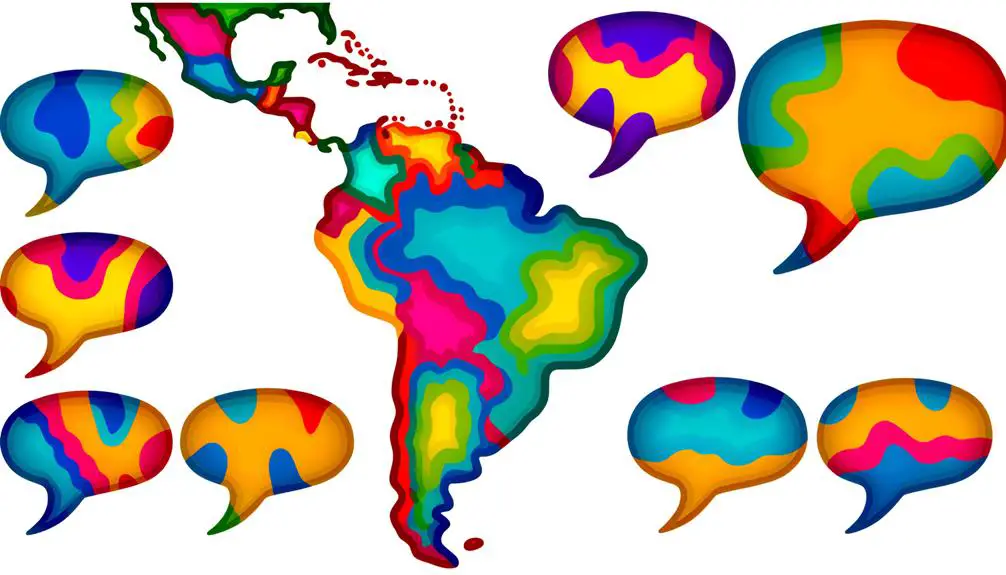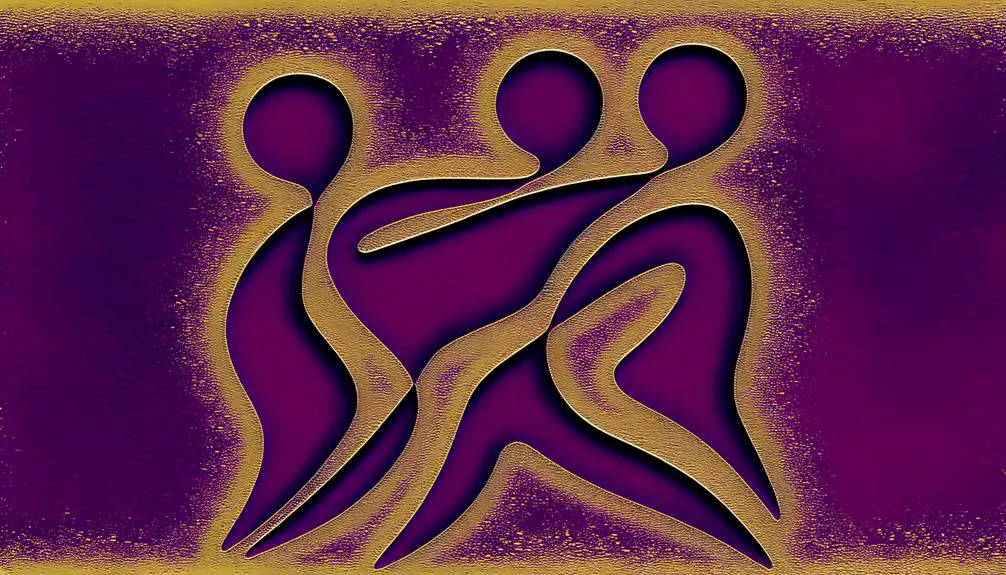You'll encounter a vast and complex landscape of sexual slang in Spanish, shaped by regional variations, cultural nuances, and historical contexts that stretch from Argentina to Spain. Slang expressions for body parts, sexual acts, and positions vary across regions, reflecting cultural attitudes and historical roots. You'll find that insults and vulgarities also differ across regions, rooted in cultural taboos and historical customs. As you navigate this dynamic landscape, you'll discover that modern slang is influenced by internet trends and online platforms, contributing to an ever-changing language and culture. Ahead, you'll uncover the intricacies of Spanish slang and the cultural contexts that shape it.
Regional Variations in Slang

Exploring Spanish-speaking countries, regional slang variations emerge as a result of cultural, historical, and geographical factors that shape local idioms and expressions. As you explore the world of sexual slang, you'll notice dialect differences that reflect the unique cultural nuances of each region.
For instance, in Argentina, the Lunfardo dialect has a distinct Italian influence, while in Mexico, indigenous languages have contributed to the development of slang. In Spain, the Andalusian dialect has a distinctive flavor, shaped by the region's Moorish past. These dialect differences are a reflection of the complex cultural heritage of Spanish-speaking countries.
You'll find that certain expressions are specific to particular regions, such as the use of 'polvo' in Chile to refer to a sexual encounter, or 'revolcón' in Peru to describe a casual sexual encounter. Understanding these regional variations is essential to grasping the complexities of sexual slang in Spanish.
Slang for Body Parts
When exploring sexual slang in Spanish, you'll encounter a range of colloquial terms for body parts that vary in vulgarity and regional usage. These colloquialisms often reflect cultural attitudes towards sexuality and the human body.
For instance, genitalia slang exhibits cultural differences, with some terms being more vulgar in certain regions than others. In Spain, the term 'polla' is commonly used for male genitalia, whereas in Latin America, 'verga' or 'picho' are more prevalent.
The historical evolution of breast slang is also remarkable. In some Latin American countries, 'tetillas' is used to refer to breasts, while in Spain, 'pechos' or 'tetas' are more common. Remarkably, the term 'tetillas' is considered more vulgar in Spain, whereas in Latin America, it's a more neutral term.
Understanding these regional variations is essential to comprehend the nuances of sexual slang in Spanish. By recognizing the cultural and historical contexts of these colloquialisms, you'll gain a deeper appreciation for the complexities of sexual language in Spanish-speaking cultures.
Sexual Acts and Positions

As you explore the complexities of sexual slang in Spanish, you'll discover that colloquialisms for sexual acts and positions are often regionally specific and culturally nuanced. Understanding these variations is essential for effective communication and avoiding misunderstandings.
In Spain, for instance, 'práctica del 69' refers to simultaneous oral sex, while in some Latin American countries, 'coger' is a common term for sexual intercourse. When it comes to kinky preferences, you might hear 'juego sucio' (dirty game) or 'juego erótico' (erotic game) to describe BDSM activities. Erotic fantasies are also expressed through colloquialisms, such as 'fantasía sexual' or 'fantasía erótica.'
Additionally, you might come across regional terms like 'la posición del misionero' (the missionary position) or 'la posición del perro' (doggy style). Familiarizing yourself with these terms will help you navigate conversations about sexual acts and positions with confidence and respect for cultural differences.
Insults and Vulgarities
In Spanish, you'll encounter a vast array of insults and vulgarities that can be regionally specific, culturally sensitive, and highly context-dependent. These expressions often reflect cultural taboos and historical roots, making them complex and multifaceted.
You'll find that certain words or phrases can be offensive in one region but not in another, and that cultural norms and traditions play a significant role in shaping their usage.
When exploring insults and vulgarities in Spanish, understanding the historical roots of these expressions is vital. Many have evolved from ancient customs, myths, and legends, while others have been influenced by colonialism, imperialism, and social upheaval.
For instance, certain insults may have originated from medieval times, while others may be more recent, emerging from urbanization and modernization.
Recognizing the cultural context and historical roots of insults and vulgarities in Spanish is fundamental for effective communication and avoiding unintentional offense.
Modern Slang and Internet Trends

You'll find that modern Spanish slang is heavily influenced by internet trends, with new words and expressions emerging from online platforms and social media. As a result, you'll notice a significant impact of TikTok lingo on contemporary Spanish slang. TikTok's short-form videos have given rise to a new vocabulary, with words like 'simp' (an obsessive fan) and 'cap' (to lie or exaggerate) becoming part of everyday conversations.
Online flirting has also contributed to the evolution of Spanish slang, with terms like 'ligar' (to flirt) and 'tontear' (to playfully flirt) becoming increasingly popular. You'll also observe that online platforms have created new ways of expressing oneself, such as using emojis and abbreviations like 'tbh' (to be honest) and 'idk' (I don't know).
The internet's influence on modern Spanish slang is undeniable, and as you explore this domain, you'll discover a dynamic and ever-changing landscape of language and culture.
Frequently Asked Questions
How Does Sexual Slang Vary Across Different Latin American Countries?
As you explore the diverse cultural landscape of Latin America, you'll discover that country-specific differences in slang are more than just a coincidence. Regional dialects play a significant role in shaping the nuances of sexual slang.
For instance, Argentina's Lunfardo dialect influences its unique slang, while Mexico's indigenous languages impact its colloquialisms. You'll find that each country's distinct history, geography, and cultural heritage converge to create distinct sexual slang profiles.
Are There Any Sexual Slang Words That Are Universally Accepted?
When exploring sexual slang globally, you'll find that certain terms transcend cultural boundaries. While regional nuances exist, some expressions have become universally accepted.
You might be surprised to learn that taboos surrounding sex have led to a common language emerging across cultures. Global terms like 'hookup' and 'fling' have gained widespread acceptance, despite their informal nature. These words have become part of a shared vocabulary, allowing people to communicate freely about sensitive topics.
What Is the Origin of Sexual Slang Words in Spanish?
As you explore the world of slang, you're about to uncover a hidden truth.
The origin of slang words, including those with a sexual connotation, is a story worth telling.
You'll find that many Spanish slang words have Latin roots, while others are a Colonial legacy.
This blend of influences has shaped the language, reflecting the cultural fusion of the past.
How Do Cultural Norms Influence the Use of Sexual Slang?
When you examine how cultural norms influence language, you'll find that religious taboos and social conservatism play significant roles.
In conservative societies, you're more likely to find euphemisms and indirect language used to avoid offending moral standards. This avoidance can lead to the development of slang, as people find ways to communicate sensitive topics without violating cultural norms.
Can Sexual Slang Be Used in Formal or Professional Settings?
It's crucial to respect professional boundaries when it comes to using sexual slang in formal or professional settings.
While there might be formal exceptions, it's important to avoid using sexual slang in these contexts, as it can create an uncomfortable atmosphere and blur the lines of appropriate behavior.







